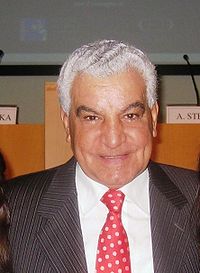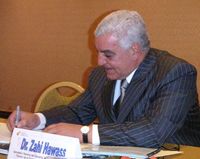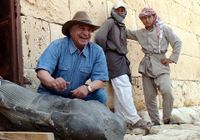Zahi Hawass
| Zahi Hawass زاهي حواس |
|
|---|---|
 Hawass in Paestum, November 2006
|
|
| Born | 28 May 1947 Damietta, Egypt |
| Nationality | Egyptian |
| Fields | Egyptology |
| Institutions | Supreme Council of Antiquities |
| Alma mater | University of Pennsylvania University of Cairo Alexandria University |
| Known for | Pyramid of Queen Sesheshet |
Zahi Hawass (Arabic: زاهي حواس; born 28 May 1947) is an Egyptian archaeologist, an Egyptologist and the Vice Minister of Culture in Egypt. He has also worked at archaeological sites in the Nile Delta, the Western Desert, and the Upper Nile Valley.
Contents |
Life and career
Hawass was born in Damietta, Egypt. He originally intended to become a lawyer, but then studied Greek and Roman archaeology at Alexandria University, where he obtained a Bachelor's degree. He obtained a diploma in Egyptology at the University of Cairo. In 1987, he received his Doctoral Degree (Ph.D) from the University of Pennsylvania, where he studied as a Fulbright Fellow.[1]
After 1988, he taught Egyptian archaeology, history and culture, mostly at the American University in Cairo and the University of California, Los Angeles. In 1993, Hawass left his position as Chief Inspector of the Giza Pyramid Plateau. According to Hawass, he resigned;[2] others claim, however, that he was fired because a valuable ancient "statue" under the custody of Hawass was stolen from Giza. He was reinstated as Chief Inspector early 1994.[3][4] In 1998, he was appointed as director of the Giza Plateau. In 2002 he was appointed Secretary General of the Egyptian Supreme Council of Antiquities. In 2009, when U.S. President Barack Obama was in Cairo, Hawass gave him personal tours of the sights of ancient Egypt. At the end of 2009, Dr. Hawass was promoted personally by President Hosni Mubarak to the post of Vice Minister of Culture.[5]
Appearances

Hawass has appeared on television specials on channels such as the National Geographic Channel, The History Channel and Discovery Channel.[6] Hawass has also appeared in several episodes of the U.S. television show Digging for the Truth, discussing mummies, the pyramids, Tutankhamun, Cleopatra, and Ramesses II. He also appeared on Unsolved Mysteries during a segment on the curse of Tutankhamun's tomb. Currently Hawass is appearing on a show on The History Channel, Chasing Mummies.
Hawass also worked alongside Egyptologist Otto Schaden during the opening of Tomb KV63 in February 2006 — the first intact tomb to be found in the Valley of the Kings since 1922.[7]
In June 2007, Hawass announced that he and a team of experts may have identified[8] the mummy of Hatshepsut in KV60, a small tomb in the Valley of the Kings.[9] The opening of the sealed tomb was described in 2006 as "one of the most important events in the Valley of the Kings for almost a hundred years."[10]
Hawass helped create and host the documentary Egypt's Ten Greatest Discoveries.
Views
Return of artifacts to Egypt

Hawass is currently spearheading a movement to return many prominent unique and/or irregularly taken Ancient Egyptian artifacts, such as the Rosetta Stone, the bust of Nefertiti, the Dendera zodiac ceiling painting from the Dendera Temple, the bust of Ankhhaf (the architect of the Khafra Pyramid), the faces of Amenhotep III's tomb at the Louvre Museum, the Luxor Temple's obelisk at the Place de la Concorde and the statue of Hemiunu, nephew of the Pharaoh Khufu, builder of the largest pyramid, to Egypt from collections in various other countries. In July 2003, the Egyptians requested the return of the Rosetta Stone from the British Museum. Hawass, as secretary general of the Supreme Council of Antiquities in Cairo, told the press, "If the British want to be remembered, if they want to restore their reputation, they should volunteer to return the Rosetta Stone because it is the icon of our Egyptian identity."[11][12] Referring to antiquities at the British Museum, Hawass said “These are Egyptian monuments. I will make life miserable for anyone who keeps them.” Britain has refused to return them.[13]
Opposition to Afrocentrists
He is opposed to the claims of Afrocentrists.[14] According to Hawass "Tutankhamun was not black, and the portrayal of ancient Egyptian civilization as black has no element of truth to it."[14]
DNA testing of Egyptian mummies
Hawass is skeptical of DNA testing of Egyptian mummies. He stated that "From what I understand, it is not always accurate and it cannot always be done with complete success when dealing with mummies. Until we know for sure that it is accurate, we will not use it in our research".[15] In December 2000, a joint team from Waseda University in Japan and Cairo's Ain Shams University tried to get permission for DNA testing of Egyptian mummies, but was denied by the Egyptian Government. Hawass added that DNA analysis was out of the question because it would not lead to anything.[16] In February 2010, Hawass and his team announced that they had analyzed the mummies of Tutankhamun and ten other mummies and said that the king may have died from a malaria infection that followed a leg fracture.[17]
Statements about Jews
Hawass has been a long-standing opponent of normalized relations between Israel and Egypt.[18]
In January 2009, Hawass wrote in Al-Sharq Al-Awsat that "The concept of killing women, children and elderly people... seems to run in the blood of the Jews of Palestine" and that "the only thing that the Jews have learned from history is methods of tyranny and torment - so much so that they have become artists in this field." He explained that he was not referring to the Jews' "[original] faith" but rather "the faith that they forged and contaminated with their poison, which is aimed against all of mankind."[19]
In an interview on Egyptian television in April 2009, Hawass stated that "although Jews are few in number, they control the entire world" and commented on the "control they have" of the American economy and the media.[20][21][22] He later clarified that he was using rhetoric to explain political fragmentation among the Arabs and that he does not believe in a "Jewish conspiracy to control the world".[23]
Criticism
Hawass has been widely accused of domineering behaviour, forbidding archaeologists to announce their own findings, and courting the media for his own gain after they were denied access to archaeological sites because, according to Hawass, they were too amateurish.[24] Others however, including several Egyptologists, have said in interviews that most of what Hawass has done for the field was long overdue.[24] Hawass has typically ignored or dismissed his critics, and when asked about it, he indicated that what he does is for the sake of Egypt and the preservation of its antiquities[25]. Hawass has instituted a systematic program for the preservation and restoration of historical monuments, while training Egyptians to improve their expertise on methods of excavation, retrieval and preservation.[26]
Maimonides Synagogue incident
In March 2010 Hawass canceled the official re-opening of the restored historic Maimonides Synagogue in Cairo. In his email cancellation message issued in Arabic he described the Jewish dedication ceremony on March 7, which included dancing and serving wine, as "provocation to the feelings of hundreds of millions of Muslims in Egypt and around the world...”. In an English-language statement issued a few hours later the remarks about "drinking and dancing" were removed.[27] Hawass said that the decision was made at "a time when Muslim holy sites in occupied Palestine face assaults from Israeli occupation forces and settlers..."[27][28] He later also said that canceling the ceremony was a "strong slap in the face" to "the Zionist enemy" [18] and that he would "not allow any Jew to pray in the temple, and would not allow any Israeli to pray in the temple.” [29]
Works
Hawass has written and co-written many books relating to Egyptology. Many of his books coincide with his positions of Ancient Egypt. He is the author of many books including King Tutankhamun: The Treasures from the Tomb,[30] published to coincide with a major exhibition in the UK.[31] He has also written an article on Tutankhamun in Ancient Egypt magazine, and has written several articles for this bi-monthly UK-based magazine in the past.
Hawass is a regular columnist for Egypt Today magazine[32] and the online historical community, Heritage Key. He has narrated several videos on Egyptology, including a series on Tutankhamun.[33]
References
- ↑ The Funerary Establishments of Khufu, Khafra and Menkaura During the Old Kingdom. Zahi A. Hawass, the University of Pennsylvania, retrieved 1 Sept 2010 [1]
- ↑ "From the Notebook of Dr. Zahi Hawass". http://www.egypttoday.com/article.aspx?ArticleID=6785.
- ↑ "The Modern Riddle of the Sphinx". http://www.dreamscape.com/morgana/hancock.htm.
- ↑ "Additional Information on the Giza Plateau from Graham Hancock". http://www.lauralee.com/sphinx.htm. "Archaeological Developments at Giza by Robert Bauval". http://circulartimes.org/Archaeological%20Geological%20Chamber%20Shaft%20Great%20Pyramid%20Sphinx%20Robert%20Bauval%201997%20Reprint%20from%20Circular%20Times.htm.
- ↑ Hawass, Zahi. "Dr. Hawass Named Vice Minister of Culture of Egypt". Dr.hawass.com. http://www.drhawass.com/blog/dr-hawass-named-vice-minister-culture-egypt. Retrieved 12 August 2010.
- ↑ "www.history.com/minisites/lostpyramid". http://www.history.com/minisites/lostpyramid.
- ↑ "KV-63 ~ Newly Discovered Tomb". http://www.kv-63.com/.
- ↑ "The Quest for Hatshepsut - Discovering the Mummy of Egypt's Greatest Female Pharaoh". http://www.drhawass.com/events/quest-hatshepsut-discovering-mummy-egypts-greatest-female-pharaoh.
- ↑ "Zahi Hawass's home page". http://www.drhawass.com.
- ↑ "King Tut's Mystery Tomb Opened", video documentary, Discovery Channel, first aired 9 July 2006
- ↑ Charlotte Edwardes and Catherine Milner (2003-07-20). "Egypt demands return of the Rosetta Stone". The Daily Telegraph. http://www.telegraph.co.uk/news/worldnews/africaandindianocean/egypt/1436606/Egypt-demands-return-of-the-Rosetta-Stone.html. Retrieved 2010-08-12.
- ↑ Henry Huttinger (2005-07-28). "Stolen Treasures: Zahi Hawass wants the Rosetta Stone back, among other things". Cairo Magazine. http://www.cairomagazine.com/?module=displaystory&story_id=1238&format=html. Retrieved 2006-10-06.
- ↑ Williams, Daniel (Jan. 27, 2010). "Egypt Relics Chief Pulls in Revenue as He Fights for Nefertiti". Bloomberg Businessweek (Bloomberg News). http://www.businessweek.com/news/2010-01-26/egypt-relics-chief-pulls-in-revenue-as-he-fights-for-nefertiti.html. Retrieved 12 August 2010.
- ↑ 14.0 14.1 "Egyptology News» Blog Archive » Hawass says that Tutankhamun was not black". http://touregypt.net/teblog/egyptologynews/?p=2929.
- ↑ "Unravelling the Mummy Mystery - Using DNA (citing Interview with al-Ahram issue 512.)". Egyptology Online. http://www.egyptologyonline.com/using_dna.htm. Retrieved 2009-04-10.
- ↑ "Unravelling the Mummy Mystery - Using DNA (citing Interview with "Travel Egypt" magazine, 2004.)". Egyptology Online. http://www.egyptologyonline.com/using_dna.htm. Retrieved 2009-04-10.
- ↑ Roberts, Michelle (2010-02-17). "'Malaria and weak bones' may have killed Tutankhamun". BBC. http://news.bbc.co.uk/2/hi/health/8516425.stm. Retrieved 17 February 2010.
- ↑ 18.0 18.1 "Egypt antiquities chief: I gave the Zionist enemy a slap in the face". Haaretz. http://www.haaretz.com/hasen/spages/1159674.html. Retrieved 2010-03-30.
- ↑ Antisemitic Statements and Cartoons in Wake of Gaza War, MEMRI, March 30, 2009.
- ↑ The Jews' secret weapon: Bickering by Jonathan Kay, National Post, April 20, 2009.
- ↑ Video Clip: Renowned Egyptian Archeologist Zahi Hawass: Jews Control the Entire World, MEMRI, March 30, 2009.
- ↑ Renowned Egyptian Archeologist Zahi Hawass: Jews Control the Entire World, MEMRI, Clip No. 2049 - transcript, February 11, 2009.
- ↑ Clarification of Remarks on Jewish History, Zahi Hawass's blog.
- ↑ 24.0 24.1 The Show-Biz Pharaoh of Egypt's Antiquities. Sharon Waxman. New York Times. 13 June 2005.
- ↑ Parker, Ian (2009), "The Pharaoh", The New Yorker, 16 November issue, pp 53–63.
- ↑ Hawass, Zahi (May 2005). "A New Era for Museums in Egypt". Museum International (Oxford: Blackwell Synergy) 57 (1-2): 7–23. doi:10.1111/j.1468-0033.2005.00505.x.
- ↑ 27.0 27.1 "Egypt Scraps Synagogue Ceremony". Business week. March 14, 2010. http://www.businessweek.com/news/2010-03-14/egypt-scraps-synagogue-ceremony-after-dancing-and-drinking.html.
- ↑ AFP (March 14, 2010). "Egypt scraps synagogue ceremony after 'provocative' acts". France 24. http://www.france24.com/en/20100314-egypt-scraps-synagogue-ceremony-after-provocative-acts-0.
- ↑ "Jews Barred from Cairo's Maimonides Synagogue". Arutz Sheva. http://www.israelnationalnews.com/News/News.aspx/136755. Retrieved 2010-08-12.
- ↑ "King Tutankamun: The Treasures of the Tomb : Books : Thames & Hudson". http://www.thameshudson.com/en/1/9780500051511.mxs?4d1cff8d28c67731007099a18c196d97.
- ↑ "King Tut and the Golden Age of the Pharaohs Exhibition". http://www.kingtut.org/home.
- ↑ "Egypt Today - The Magazine Of Egypt". http://www.egypttoday.com.
- ↑ "heritage-key.com/video/death-king-tut-murder-or-accident-feat-dr-zahi-hawass". http://heritage-key.com/video/death-king-tut-murder-or-accident-feat-dr-zahi-hawass.
- A Case in Antiquities for ‘Finders Keepers’, John Tierney, The New York Times, 2009
Further reading
Schulz, Matthias (28 May 2010). "Egypt's Avenger of the Pharaohs". DER SPIEGEL. http://www.spiegel.de/international/zeitgeist/0,1518,697174,00.html.
External links
- The king of the pharaohs – Tim Radford; The Guardian, 27 November 2003.
- DrHawass.com Official Website of Zahi Hawass starting 2009
- The Plateau Official Website of Zahi Hawass until 2009
- Zahi Hawass on Twitter
- Zahi Hawass at the Internet Movie Database